Imbalance of power: Why low-wage, working women bear the brunt of anti-mask backlashes
- Oops!Something went wrong.Please try again later.
Linda Sanchez knew that pushing customers to wear a face covering at San Diego’s Rockin’ Baja Lobster restaurant could turn out badly, leading to yelling, cursing and lost tips.
"All kinds of bad comments, bad language,” said Sanchez, an immigrant from Colombia who works as a server and assistant manager at the eatery in historic Old Town. "And all the time, I’m thinking to myself, there goes my 20. If I say something, they’re going to leave.”
One incident this year sticks with her: A woman went ballistic after several requests to mask up, yelling about her rights and berating Sanchez. “She says, ‘Go back to your country. You don’t even have papers,’” Sanchez recalled.
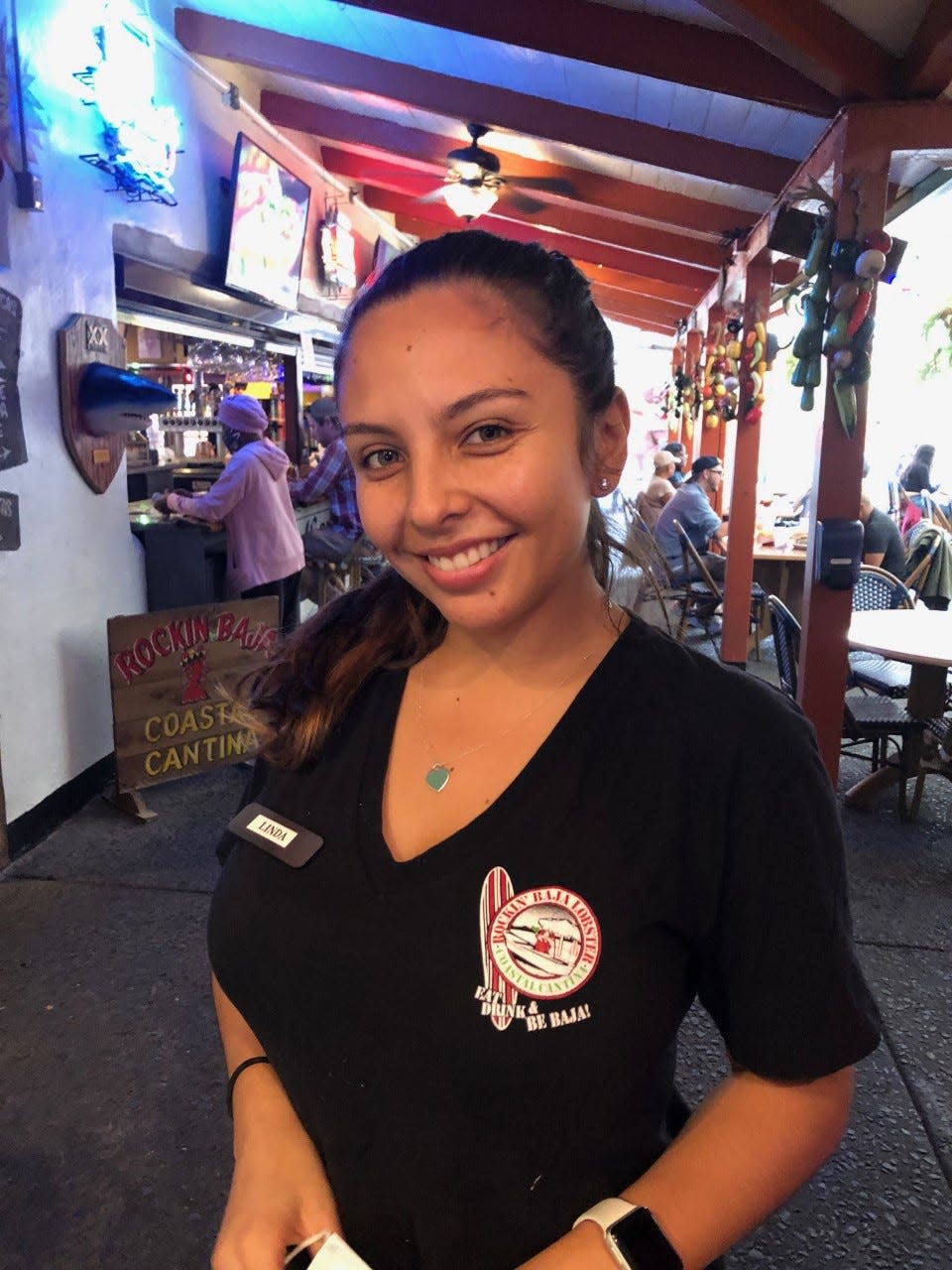
That's a snapshot of the hostility endured by America's service workers who, in the midst of the pandemic, are responsible for policing mask and vaccination policies. Social scientists, labor activists and other experts say the burden and trauma have been borne mostly by women because they dominate the low-paying jobs in which employees interact with the public.
Flight attendants, food servers, retail employees, nurses and workers in dozens of public-facing jobs have been verbally assailed or physically assaulted while functioning as nearly powerless enforcers.
Women-dominated positions have become “the first line of defense” when it comes to mask mandates and vaccine verification, said Christine Williams, a University of Texas at Austin sociology professor who studies gender, race and class inequities.
“It’s built into their jobs,” Williams said. “I think you’ll find a lot of people in those positions take it on the chin on a daily basis.”
A growing body of research suggests that unruly and even dangerous reactions are often accompanied by sexual harassment and racism.
“Being perceived as the weaker sex, physically and in other ways, I think they (women) see this a lot more,” said Meghna Sabharwal, a professor and department head in the Public and Nonprofit Management program at the University of Texas at Dallas.
A survey by University of Massachusetts Amherst behavioral scientists Clare Hammonds and Jasmine Kerrissey found that nearly half of workers who ask customers to follow mask rules experience problems with compliance, especially in the hospitality and retail industries. Sixty percent of those earning less than $15 an hour face resistance, including rudeness and threats.
Williams and other experts said America’s business ethos – “the customer is always right” – puts service employees at a disadvantage that is compounded by inexperience and dependence on tips.
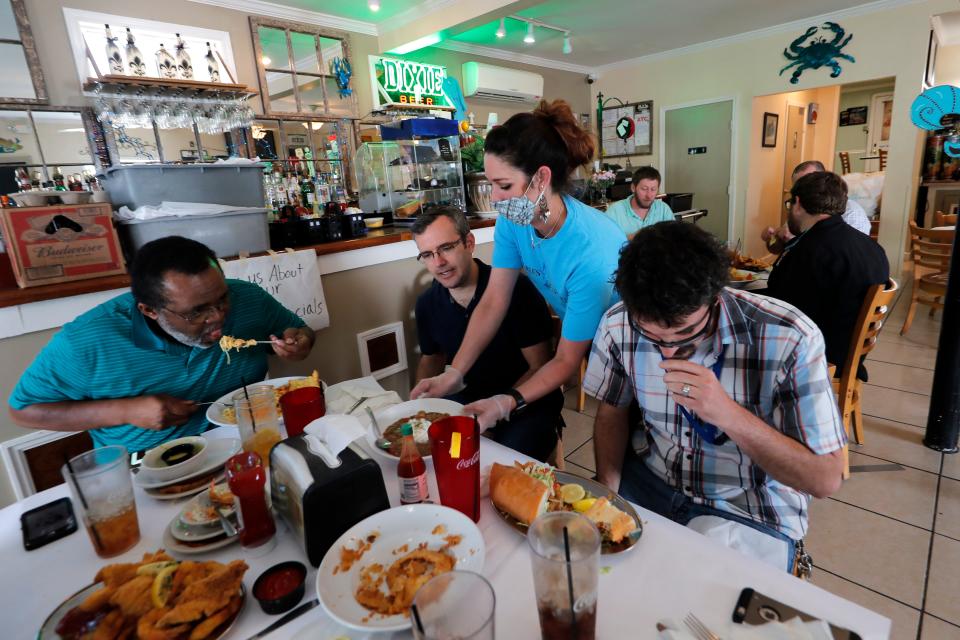
Nancy Wong, a University of Wisconsin-Madison professor of consumer research and marketing, said the imbalance is magnified when employees are female because anger about mask mandates can trigger sexist bullying and harassment.
“There is a power differential, and it is exacerbated by gender,” Wong said.
That differential surfaces in other ways. A poll by Gallup in July, amid a resurgence in coronavirus cases, found that 81% of women said they always or often wear a mask outside the home, compared with 63% of men.
Another academic study concluded that more men resist masks because they perceive them as shameful, uncool or a sign of weakness. Men are more likely to contract COVID-19, less likely to seek treatment, and more likely to die from the virus.
In the workforce, women have been disproportionately harmed by COVID-19: Females face greater on-the-job health risks than men, and during the first year of the pandemic, they accounted for 55% of all U.S. job losses, according to the National Women's Law Center.
Women are on the front lines of COVID-19 precautions enforcement
When COVID-19 precautions trigger hostility, the outcome sometimes winds up on social media.
At Carmine’s Italian Restaurant on the Upper West Side of New York City, three customers from Texas were arrested last month after they allegedly attacked a hostess who asked them for proof of vaccination.
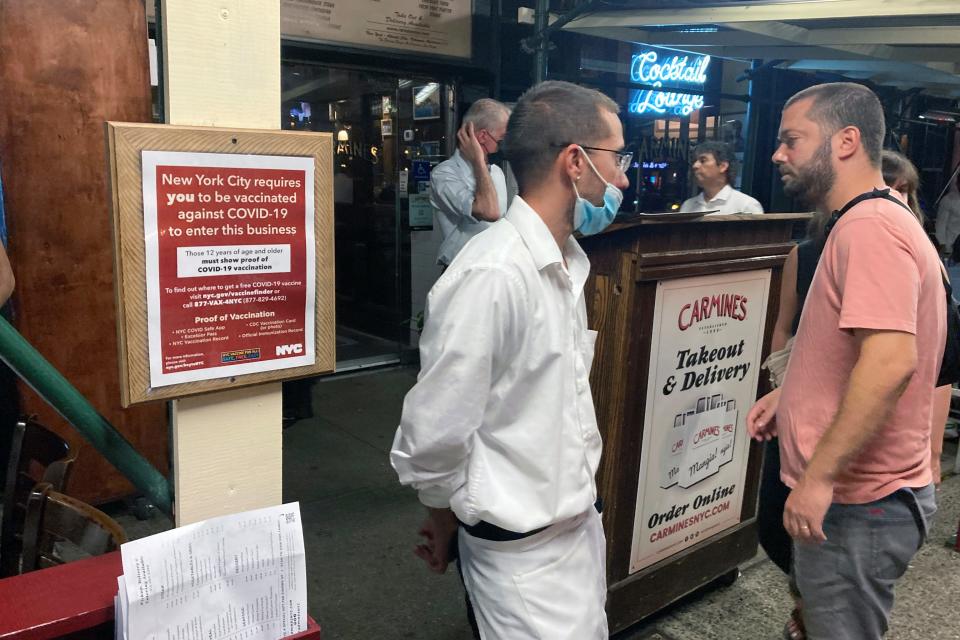
In October 2020, Southwest Airlines passenger Vyvianna Quinonez became so enraged about mask enforcement that she punched a female flight attendant in the mouth, causing her to lose two teeth, according to federal court records. (Quinonez's case is pending; she could not be reached, and her attorney did not respond to an interview request.)
In June 2020, a woman made local news when she screamed at female employees in a North Hollywood Trader Joe's market because she was asked to wear a mask.
The next month, the Retail Industry Leaders Association became so alarmed by “instances of hostility and violence” against workers that it urged all governors to require shoppers to wear masks. The National Retail Federation sought a national mask mandate.
Although those pleas went unheeded, businesses from mom-and-pop shops to Walmart have asked employees to enforce COVID-19 requirements. Such rules have varied by time and location during different stages of the pandemic.
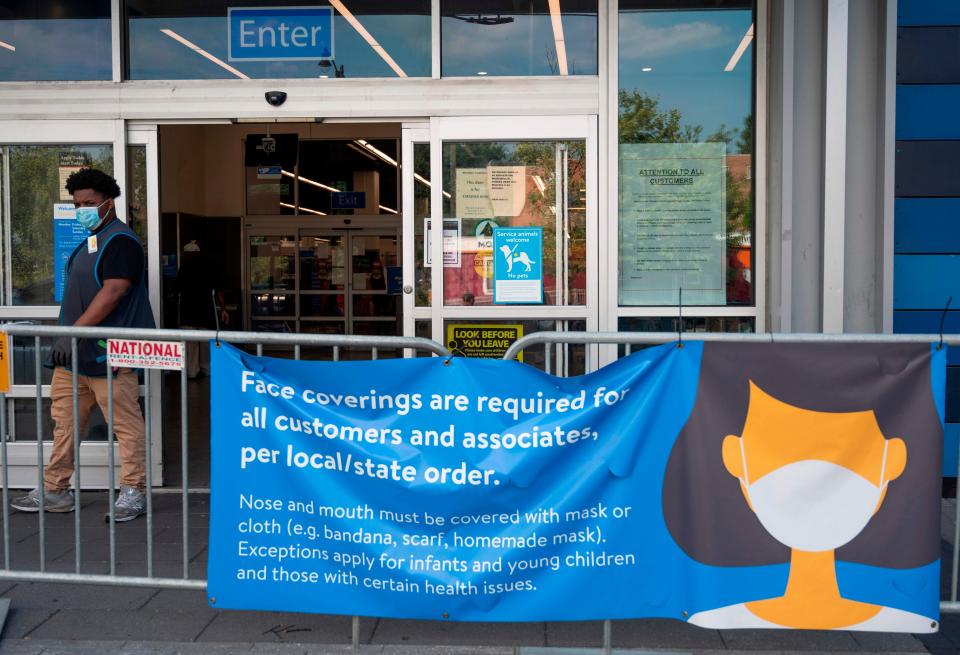
Ensuing disputes prompted the Centers for Disease Control and Prevention to issue guidance in August calling on businesses and employees to avoid dangerous altercations. Among the tips: “Don’t attempt to force anyone who appears upset or violent to follow COVID-19 prevention policies.”
There is no official definition for what is considered a service industry job, but federal data indicates women make up a much larger share of the workforce that deals with the public.
According to the Bureau of Labor Statistics, women account for 80% of flight attendants, 89% of registered nurses and 70% of food servers. The Census Bureau says women make up nearly 57% of the nation’s retail workforce.
Alicia Grandey, a Penn State University professor of industrial-organizational psychology, said her survey of restaurant employees indicated not only that customers served by women are less likely to honor mask rules, but those without masks are more frequently rude to employees.
“Women being overrepresented in these types of jobs means that they are more likely to experience this power abuse,” Grandey said.
Fly the friendly skies
In congressional testimony last month, Sara Nelson, president of the Association of Flight Attendants-CWA, decried the “combative, abusive, defiant and violent behavior on our planes and in our airports.”
Nelson has flown for 25 years and represents 100,000 colleagues, nearly three-quarters of whom are women.
She said 4,284 Federal Aviation Administration reports have been logged about unruly passengers this year, more than three-quarters of which were due to mask confrontations. If they continue at that rate, it may result in “more incidents in 2021 than the entire history of commercial aviation,” Nelson said.
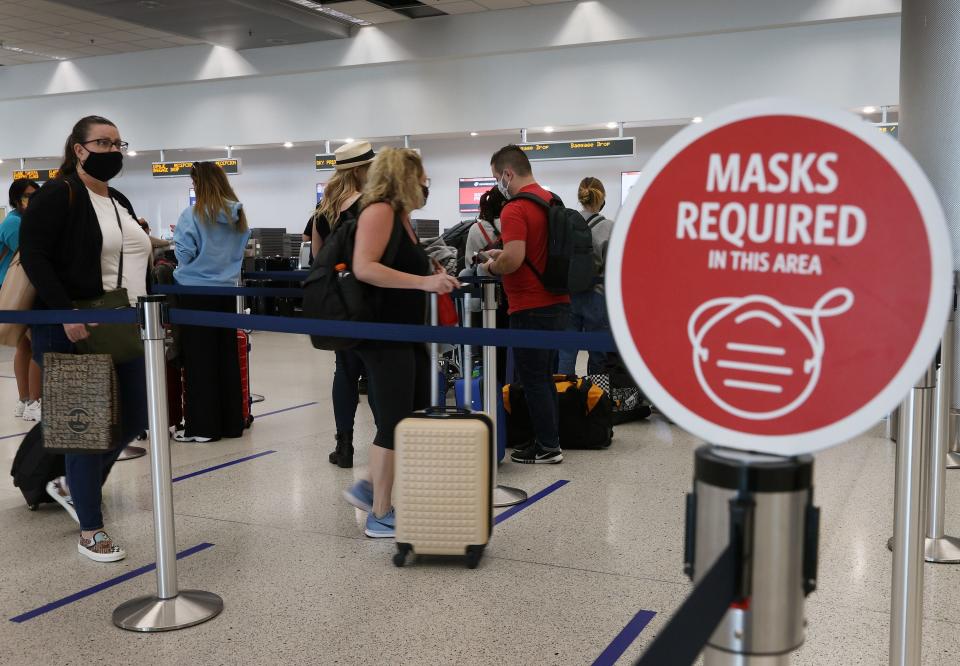
“But the numbers don't tell the full story about the impact on front-line workers," she said, "or just how dangerous this behavior is for aviation safety.”
During the first half of 2021, Nelson said, a survey of flight attendants from 30 airlines found that 85% had incidents with unruly passengers, 17% of which involved physical confrontations. Six out of 10 reported that disruptive passengers used racist, sexist and/or homophobic slurs. Only 3 in 10 of those who filed incident reports got any response from management.
Confrontations have become so common that Delta Air Lines banned 1,600 passengers and urged competitors to collaborate on a no-fly list of unruly customers.
On Sept. 9, President Joe Biden said viral videos of attacks on airline employees are ugly. Biden urged passengers to “show some respect” and warned that those who harass flight attendants over mask mandates should “be prepared to pay.”
Want a tip? Take off your mask first
In December, the Time's Up Foundation, a nonprofit dedicated to promoting job equity and dignity for women, released survey results showing restaurant workers have been hit with a triple-whammy amid the pandemic.
In addition to customer aggression over mask enforcement, the foundation said, “workers are being subjected to shockingly high rates of exposure to the virus, and increased sexual harassment.”
The report, titled “Take Off Your Mask So I Know How Much to Tip You,” concludes:
More than three-quarters of food service workers reported experiencing or witnessing hostile behavior from customers in response to mask rules.
41% reported an increase in “unwanted sexualized comments,” and more than a quarter said they experienced or witnessed more sexual harassment.
About two-thirds reported declines in tips by at least half.
Dozens of servers reported that male customers asked them to remove their masks "so that they could judge their looks, and, implicitly, determine their tips on that basis," the report says. "Many comments were even more sexually explicit.”
Those stresses have helped fuel a nationwide exodus from the food service industry, leaving many restaurants understaffed and causing burnout among those who remain.
Pietro Busalacchi, owner of Trattoria Don Pietro in San Diego, said he’s lost 30% of his staff over the past year and has been forced to increase salaries even as he's lost money during the pandemic.
As some workers quit over mask anxieties and reduced tips, Busalacchi said, those who remain become overwhelmed. “When you start policing people," he said, "it puts employees in such a vulnerable place.”
Overcoming a 'respect shortage'
Mark Babbitt, co-author of "Good Comes First," a book on workplace culture, argued it is time for American businesses to overturn the notion that the customer is always right.
“We don’t have a labor shortage in the hospitality industry," Babbitt said. "We have a respect shortage.”
He contended many customers operate from a sense of entitlement that is reinforced when supervisors don’t stand up for service workers. “Male managers – especially older males – are always going to jump to the side of customers because that’s how they’ve been trained,” he said.
The solution, he said, is a business code in which managers and workers agree to respect one another and customers.
Grandey, the Penn State researcher, said workers' disadvantages are magnified by an ethos that requires service with a smile, no matter how a client behaves. “If you don’t value your employee as much as your customer, they’re going to leave," she said. "And that’s what we’ve been seeing.”
To overcome inequities, Grandey said, businesses need to communicate pandemic rules clearly and support workers when guests lash out. However, when workers rely on tips for most of their income, she said, the scale will always tilt in favor of customers.
At Rockin’ Baja, Sanchez hinted that she’s taken a first step, amending the business mantra that gives clients inviolate superiority. “Yes, the customer’s always right,” she said, “but I’ll always have my employee’s back.”
This article originally appeared on USA TODAY: COVID-19 mask enforcement: Why women bear the burden and backlash

